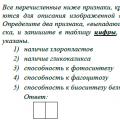Early exam in society
The Federal Service for Supervision in Education and Science has prepared a draft timetable for the unified state exam (USE), the main state exam (OGE) and the state final exam (GEE) for 2016.
The exams will be held in two stages: early and basic.
The early stage of the USE starts on March 21, 2016. The main stage of the USE will traditionally begin with elective subjects: geography and literature, from May 27, 2016.
As in 2015, the draft timetable for the USE does not provide for the "July wave".
For the first time, the project provides for a separate day for the USE in social studies, which will allow a significant number of USE participants to complete the exam period within the main time frame.
In addition, along with the reserve dates for the USE, OGE and GVE in certain academic subjects, there is an additional reserve day for examinations in all academic subjects.
Students who did not pass or received unsatisfactory results in March-June will be able to retake Russian and (or) mathematics in September 2016.
Rosobrnadzor until September 24 of the current year accepts proposals and comments on the draft schedule by e-mail: [email protected].
date | OGE and GVE |
||
| Early period | |||
mathematics B | maths | ||
informatics and ICT, history | informatics and ICT, history | ||
Russian language | Russian language | ||
mathematics P | |||
Social Studies | Social Studies | ||
geography, literature | geography, literature | ||
physics chemistry | physics chemistry | ||
foreign languages (oral) | |||
foreign languages, biology | foreign languages, biology | ||
reserve: Russian | reserve: Russian | ||
reserve: mathematics B, P | reserve: mathematics | ||
Russian language |
|||
reserve: literature, chemistry, informatics and ICT | reserve: literature, chemistry, computer science and ICT, physics, biology | ||
reserve: foreign languages, history, social studies | reserve: foreign languages, history, social studies, geography | ||
reserve: foreign languages (oral), geography, physics, biology | |||
maths |
|||
foreign languages |
|||
reserve: geography, history, biology, literature, physics, social studies, chemistry, computer science and ICT, foreign languages |
|||
|
|||
reserve: in all subjects |
|||
| The main stage | |||
foreign languages |
|||
Geography, literature | Geography, literature | ||
foreign languages |
|||
Russian language | Russian language | ||
maths |
|||
Mathematics B | Maths | ||
Russian language |
|||
Mathematics P | |||
social studies, chemistry, informatics and ICT, literature |
|||
Social Studies | Social Studies | ||
geography, history, biology, physics |
|||
Foreign languages (oral) | |||
Foreign languages (oral) | |||
Foreign languages, biology | Foreign languages, biology | ||
reserve: geography, history, biology, physics, foreign languages |
|||
Informatics and ICT, history | Informatics and ICT, history | ||
reserve: Russian language, mathematics |
|||
Chemistry, physics | Chemistry, physics | ||
reserve: in all subjects |
|||
| reserve: geography, foreign languages, chemistry, social studies, informatics and ICT | ||
reserve: foreign languages (oral) | |||
| reserve: literature, physics, history, biology | ||
reserve: Russian | reserve: Russian | ||
reserve: mathematics B, P | reserve: mathematics | ||
reserve: in all subjects | reserve: in all subjects | ||
| Additional period for GIA-9 (August dates) | |||
Russian language |
|||
geography, history, biology, physics |
|||
foreign languages |
|||
maths |
|||
social studies, chemistry, informatics and ICT, literature, |
|||
reserve: Russian language, mathematics |
|||
reserve: geography, history, biology, literature, physics, social studies, chemistry, foreign languages, informatics and ICT, |
|||
| Additional period (September dates) | |||
Russian language |
|||
geography, history, biology, physics |
|||
foreign languages |
|||
mathematics B, P | maths | ||
maths |
|||
social studies, chemistry, informatics and ICT, literature, |
|||
reserve: Russian language, mathematics |
|||
reserve: geography, history, biology, literature, physics, social studies, chemistry, foreign languages, informatics and ICT |
|||
Russian language | Russian language | ||
reserve: Russian language, mathematics B, P | reserve: Russian language, mathematics | ||
On October 3, "Uchitelskaya Gazeta" will celebrate its 95th anniversary. Throughout its history, the country's main pedagogical publication has undergone many changes and was able to overcome many obstacles. In the 30s, for example, it was generally necessary to prove the importance and necessity of the newspaper. Of course, not to teachers, but to those in power. About the struggle for circulation and endless dedication to the cause - in the article by Vyacheslav Ogryzko.
In Sicily, it is customary to treat education more simply, you can freely consult with teachers about something personal, and instead of lessons you are allowed to go on ... a strike. Not an island, but a teenager's dream! Is it so? All the pros and cons of studying in southern Italy are in the article by Maria Plekhanova.
"The teachers of that generation were distinguished by disinterestedness, love for children, a different attitude to work. Now it is very difficult, because children are spoiled, all with telephones, no one wants to speak Russian. But they could speak quite nicely to themselves and convey this high culture Russian literature and beyond ", - reflects on the teachers of his childhood and modern schoolchildren Andrei Urgant. Read the interview of the famous actor and TV presenter in the "UG Guest" section.
News:
news
news
22.05.2019
The Strategic Development Council discussed the implementation of the national project "Education"
The Presidium of the Presidential Council for Strategic Development discussed the implementation of the Education national project. This was reported on the website of the Ministry of Education of the Russian Federation. The Minister of Education O.Yu. Vasiliev.
21.05.2019
Unified State Exam and Augmented Reality
The USE has changed significantly over almost two decades. Basically, these changes concerned the content of control and measuring materials (CMM). The educational authorities are predicting new changes to the unified state examination.
20.05.2019
USE: new rules
In Russia, the main wave of the Unified State Exam will start in a few days. Every year, changes are made to the rules for holding the exam.
19.05.2019
Competition of scientific and technical creativity of students of the Union State "Talents of the XXI century"
The Ministry of Education of the Russian Federation, together with the Ministry of Education of the Republic of Belarus, with the direct support of the Standing Committee of the Union State, is holding a competition for scientific and technical creativity of students of the Union State "Talents of the XXI century."
18.05.2019
KIM projects for OGE (grades 9) for public discussion
On the FIPI website, in the OGE and GVE-9 section, projects of promising models of measuring materials for conducting state final certification for basic general education programs have been published
17.05.2019
Rosobrnadzor hotline on the Unified State Exam: the exam will always be free
On the eve of the main wave of the Unified State Exam, Rosobrnadzor ran a hotline for graduates and their parents.
16.05.2019
New General Education Standards: Public Discussion
The Ministry of Education organized a public discussion of the new standards. Previously, they caused a contradictory reaction from specialists. In May of this year, the results of the discussion were summed up.
15.05.2019
All-Russian action "One day for passing the exam by parents"
On February 26, the USE was held in 55 regions of Russia for the parents of graduates. The campaign "One day for parents to pass the USE", initiated by Rosobrnadzor, is designed to help graduates and their parents relieve the unnecessary stress associated with preparing for the USE, to better familiarize the public with the examination procedure.
14.05.2019
The open bank of USE assignments does not correspond to the new USE structure
On the website of the Federal Institute for Pedagogical Measurements (the developer of the Unified State Exam), an open bank of tasks for the Unified State Exam has been operating for several years. This section, of course, is very necessary for students, because the school uses a lot of manuals for preparing for the exam, which are not always of high quality.
13.05.2019
Students will be allowed to work in schools
On the official Vkontakte page, the Ministry of Education announced a new initiative: to officially allow students of technical schools and universities to work in schools.
12.05.2019
Dates of the main stage of the Unified State Exam in Social Studies in 2019
In accordance with the order of the Ministry of Education, the deadlines for the Unified State Exam, the maximum terms for checking, announcing the results of the exam and the dates of meetings of the conflict commission on appeals on disagreement with the procedure for holding the Unified State Exam and the points awarded were established.
11.05.2019
Discussing incorrect formulations of training tasks
In training tasks, published in well-known collections, books, sometimes there are typos. There are much more of them on unofficial sites dedicated to the exam. We discuss them in the Vkontakte social network community.
Social studies is one of the most popular "selective" subjects for the national examination. Statistical studies of past years show that this exam appears in the applications of 40% of future university entrants in which they teach humanitarian specialties. So, in what numbers will students have to pass in social studies, and how is the most reasonable way to prepare for the examination work? Read more about this in our article.
The Unified State Exam in Social Studies is taken by 40% of future humanities students
Demonstration version of the exam 2016
Dates of the exam in social studies
Early period
- March 30, 2016 (Wed) - Main exam
- April 22, 2016 (Fri) - Reserve
The main stage
- June 8, 2016 (Wed) - Main exam
- June 22, 2016 (Wed) - Reserve
General information
The Unified State Exam in Social Studies is a set of tasks for the humanitarian training cycle (sociology, philosophy, political science, history, jurisprudence and economics). The ticket consists of two parts - test and essay. The first part does not promise any special problems during execution. The main thing is to first solve the tests you are sure of the answers to. After that, move on to the tasks that you need to think about, and recall the material passed in preparation. After that, proceed to the final part in the form of writing an essay.
2016 exam changes
The year 2016 was marked by significant changes in the procedure for passing this exam, as well as serious adjustments to its content. Consider the innovations in social studies that the 2016 graduates will face.
- In comparison with 2015, the minimum number of points for this USE has increased and is 42 test points (19 primary points out of 62);
- The part of the exam ticket, in which the student had to familiarize himself with the proposed answer options and choose the correct one, has been excluded. In 2016, graduates will have to independently formulate the correct answer;
- The number of tasks that need to be solved by the graduate has decreased due to the reduction in the number of tasks included in the first block. Now pupils will have to solve only 29 tasks instead of 36, which were solved by schoolchildren in 2015;
- The maximum number of primary points that can be obtained for this exam is 62;
- The time allotted to schoolchildren for passing the exam has been increased - 235 minutes instead of 210, which were given earlier.
 At the exam-2016 you have to complete 29 tasks in 235 minutes
At the exam-2016 you have to complete 29 tasks in 235 minutes How to write an essay?
It is this part of the ticket that causes the greatest difficulties for schoolchildren. However, they can be easily overcome by following a few simple guidelines.
- When deciding on a ticket, allocate the time so that at least 60-70 minutes remain on the essay;
- Do not write a detailed answer on a draft - rather, sketch out the theses of your story. Otherwise, you may simply not have enough time to rewrite the prepared answer;
- Don't grab the first topic on the list. First, consider each of these options in order to find the most convenient for argumentation and presentation of your thoughts;
- Clearly define which science the topic belongs to, so that during the writing process you do not go beyond the discipline - this is not welcomed by the reviewers;
- Start with a general idea of the problem to demonstrate understanding. Emphasize the relevance of the topic. This moment is very important in order to get points for the first of the assessment criteria (K1);
- Do not use only well-known facts and historical examples as you go through the material. Be sure to state your personal position on this issue, support your agreement or disagreement with the author of the thesis with whom you are working when writing an essay with logical calculations. Do not forget about the importance and weight of the opinions of recognized authorities in this science;
- At the end of the work, you should briefly summarize all of the above and make an unambiguous and reasonable conclusion.
Essay grading criteria
In general, the essay is estimated at 5 points, of which the first part (K1) is given by the expert for a general understanding of the topic. Please note: if the reviewer thinks that you have not coped with this task, then the essay will not be reviewed. The second part of the points (K2) is awarded for the ability to apply terminology, reveal concepts and draw conclusions. The third component (K3) - points for the ability to reasonably confirm your point of view.
 Esse will require you to be able to analyze information and draw conclusions
Esse will require you to be able to analyze information and draw conclusions How to prepare for the Unified State Exam in Social Studies?
To have an idea of the test part of the ticket, it is recommended to use methodological materials approved by the Ministry of Education. A thorough study of the demo versions of the tests, which you can download on our website, will help to test your knowledge. To prepare for writing an essay, read the theses of past years and write a small work for each of them, following the scheme outlined above. This will help you learn how to structure thoughts and select argumentation on any topic.
Option No. 2061366
Unified State Exam in Social Science 03/30/2016. Early wave
When completing tasks with a short answer, write in the answer field a number that corresponds to the number of the correct answer, or a number, word, sequence of letters (words) or numbers. The answer should be written without spaces or any additional characters. Separate the fractional part from the whole decimal point. You do not need to write the measurement units. Answers to tasks 1-20 are a number, or a sequence of numbers, or a word (phrase). Write your answers without spaces, commas, or other additional characters. By completing task 29, you can show your knowledge and skills on the content that is more attractive to you. For this purpose, select only one of the suggested statements (29.1-29.5).
If the variant was set by the teacher, you can enter or upload answers to the tasks with a detailed answer into the system. The teacher will see the results of the short answer assignments and will be able to rate the uploaded answers to the extended answer assignments. The points given by the teacher will appear in your statistics.
 New rules for personal property tax
New rules for personal property tax Features of the sale of an apartment with illegal redevelopment
Features of the sale of an apartment with illegal redevelopment Rules and procedure for the exam
Rules and procedure for the exam